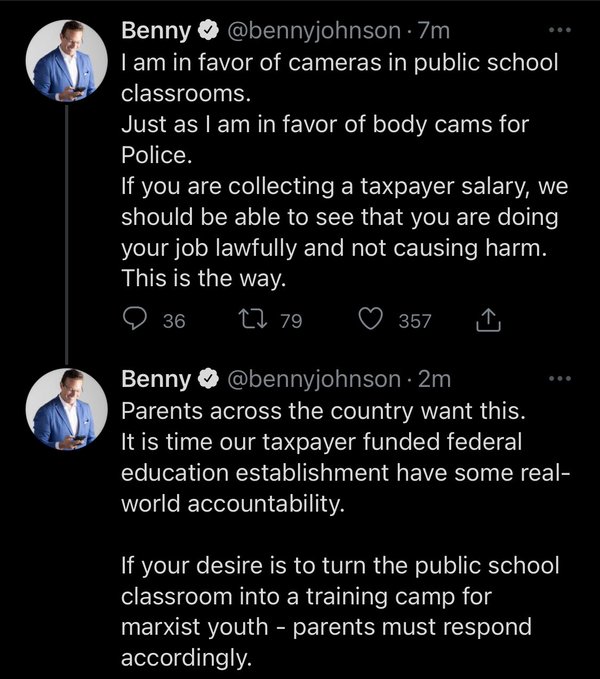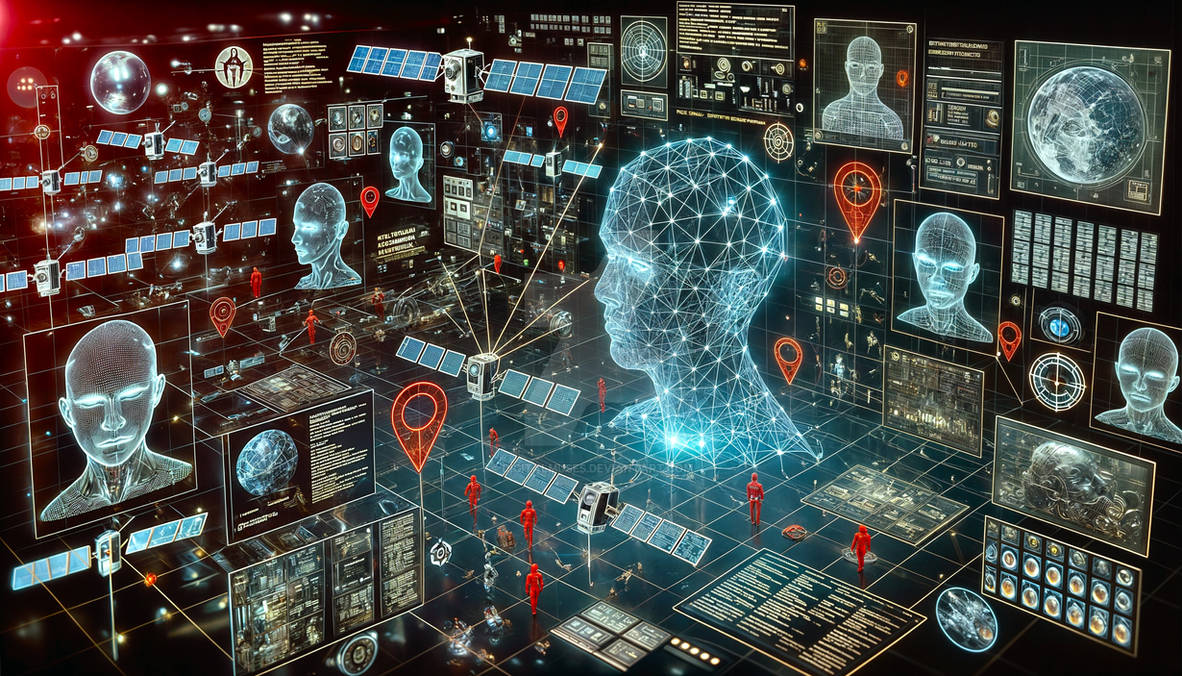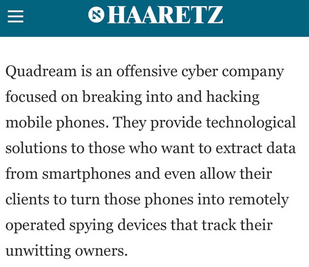So, we have this proposal for cameras and mics in classrooms:

Johnson’s not a particularly important person and one can pick apart his logic (teachers don’t have guns), but the logic of unchecked surveillance — of cameras and microphones everywhere — leads to this place and far worse.
Right now, governments and corporations track your every move through your phone. They can force your microphone on and listen to you, and we know that they have. Infrared, gait recognition, and facial recognition, combined with drones, satellites, and ubiquitous cameras mean that it will soon be possible to track citizens’ movements 24/7 and listen in much of the time. Add in the cameras and microphones most people voluntarily put into their houses, which are in no way secure and which EULAs often allow access to anyway, and there is little to none of your life that will be unknown.
We are heading to this place. It is not in question — there is a VAST appetite for information in corporations so they can train their AIs and model and manipulate you, and from governments driven by the idea that “well, if we don’t surveil everyone and anything bad happens, we can be blamed,” from police and intelligence agencies.
There is an argument, put first, so far as I know, by David Brin, that mass surveilance is inevitable. The technology will exist (he wrote in 1998) and it will be used, and the only question is whether it ends up that everyone is surveilled and everyone can watch it, or if only criminals, government, and big corps get to watch and listen, and the rest of us are just passive victims.
I will suggest that there is a third path.
We live in a time when we have repeatedly refused to actually control technology if a profit can be made from it. Obviously, evil technologies have been allowed to run rampant to the point where we may render our entire planet unliveable.
So we assume we can’t control technology: “If it exists, it will be used.”
There is a counter-example. The Japanese Tokugawa Shogunate didn’t like firearms. They limited them and, over time, got rid of most of them except for a few old ones.
That ended badly for them: The American White Ships came, forced Japan open, and the Shogunate fell to a an internal rebellion, whose motto might as well have been “More guns! Lots more Guns! And Gunships! And EMPIRE!”
But only the first part applies to rejecting most surveillance technology because surveillance tech is not a competitive advantage between states (one can argue it makes training modern “AIs” easier, but that is minor).
Surveillance states, where people know that everything they do or say is recorded, create stultifying conformity. Almost everyone acts the same way and the easiest way to act the same way is to think and feel the same way.
Since the age of helicopter parenting and insecurity (which requires kids to go to school and get good grades and do everything right), measures of American creativity have crashed.
But this is a general rule: States where you can’t be different without being punished, where you can’t say or think what others disagree with, are obviously less creative.
Less creative states are less competitive states in eras where technology and culture matter.
If any state is brave enough to outlaw surveillance tech (except in limited circumstances), and do the work to make it stick (ie. re-engineer modern telecom tech, which is designed to be insecure from the ground up, plus be pro-active and criminally punitive to those who violate the law) they will have a massive advantage over surveillance states, technologically and culturally. I’m willing to predict, with near 100 percent certainty, that if most countries go to full-surveillance state mode, whichever ones don’t are the places which will have technological and artistic golden ages — especially if they are also smart enough to welcome refugees from surveillance states.
Freedom; real freedom, is a competitive advantage in eras where technology or culture (really, the two are intertwined) determine who wins. States which embrace surveillance technology will be ones where elites are more concerned with maintaining their internal position, i.e., staying in charge of their society and keeping the peons down, rather than those who look outwards to competition against other societies and who want the most vibrant and interesting culture internally.
The choice to embrace surveillance states is the choice to stagnate.
Many think it is otherwise, “we must embrace all technologies without choosing how they are used or we will fall behind.”
This is an immature stance; a foolish one. The mature, intelligent stance is to look at technologies and see what their results are likely to be, and then use them intelligently, to control technology and not be controlled by it.
Certainly there are technologies that are so bad overall that, as long as we have individual states, we will have to use them or fall behind in a world where those who fall behind are treated abominably; but surveillance isn’t one of those technologies. Rather, embracing it will make societies less competitive and reduce their inhabitants’ quality of life. Its only advantage is for those seeking a steady-state police state or cyberpunk dystopia.
All others should steer well clear, and all individuals who aren’t themselves very powerful should understand that surveillance is intended to dis-empower them — to get the most out of them possible, while giving the least in return, and turning them into automata for the benefit of the overlords (think Amazon warehouses and delivery drivers).
You cannot be more free than if you are unknown to your masters. The more they know, the more they will control. If you let the powerful turn you into a surveillance object, they will wring you dry, and you will have to hope that some society, somewhere, is still free and defeats your dystopia.
(My writing helps pay my rent and buys me food. So please consider subscribing or donating if you like my writing.)


 Durov’s Russian, and an interesting guy.
Durov’s Russian, and an interesting guy. 

 In this time of police brutality, who can we depend upon to police the police? Who can we depend upon to police the prosecutors? The judges? Our lawmakers? You. That’s who. It’s your job. More than that, it’s your duty to your fellow man. And it’s not really even very difficult. All it takes is a little creative thinking.
In this time of police brutality, who can we depend upon to police the police? Who can we depend upon to police the prosecutors? The judges? Our lawmakers? You. That’s who. It’s your job. More than that, it’s your duty to your fellow man. And it’s not really even very difficult. All it takes is a little creative thinking.